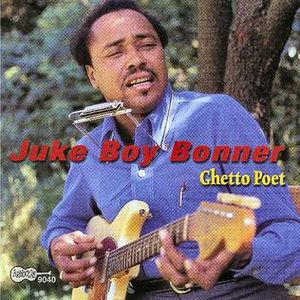Juke Boy Bonner facts for kids
Quick facts for kids
Juke Boy Bonner
|
|
|---|---|

Bonner on the cover of Arhoolie CD 9040
|
|
| Background information | |
| Birth name | Weldon Philip Bonner |
| Born | March 22, 1932 Bellville, Texas, U.S. |
| Died | June 29, 1978 (aged 46) Houston, Texas, U.S. |
| Genres | Texas blues |
| Occupation(s) | Singer, one-man band |
| Instruments | Guitar, harmonica, drums |
| Years active | 1948–1978 |
Weldon H. Philip Bonner, known as Juke Boy Bonner, was an American blues singer, harmonica player, and guitarist. He was born on March 22, 1932, and passed away on June 29, 1978. He was inspired by famous blues musicians like Lightnin' Hopkins and Jimmy Reed. Juke Boy Bonner often performed as a one-man band, playing guitar, harmonica, and drums all by himself. Some of his well-known songs include "Going Back to the Country" and "Life Is a Nightmare".
Contents
Early Life and Music Beginnings
Juke Boy Bonner was born in Bellville, Texas. He was one of nine children. Sadly, his parents passed away when he was very young. He was raised by a kind neighbor's family. In 1945, he moved to live with his older sister.
When he was just twelve years old, Bonner taught himself how to play the guitar. He earned the nickname "Juke Boy" because he often sang in local places called "juke joints." These were small, informal spots where people gathered to listen to music.
Starting a Career in Music
Bonner began his music career as a teenager. In 1948, he won first prize at a talent show in Houston, Texas. This show was hosted by a local disc jockey named Trummie Cain. Winning the show helped him get a 15-minute radio spot. This radio show was run by a record store owner named Henry Atlas.
Between 1954 and 1957, he started to record his own music. He made several singles for a record company called Irma. Not all of these songs were released right away. He recorded more music in 1960 for other labels like Goldband Records.
Health Challenges and New Inspiration
In 1963, Juke Boy Bonner faced a serious health issue. He had a large stomach ulcer and needed surgery. Almost half of his stomach was removed. This experience, along with big changes happening in the world, inspired him.
After his surgery, Bonner started writing poetry. Some of his poems were even published in a newspaper called the Houston Forward Times. While he was getting his strength back, he worked for a record company as a distributor. Once he felt better, he started playing music gigs again in the Houston area.
Recording Albums and Touring
In 1967, Bonner recorded his first full music album. It was released by Flyright Records. Later, the Arhoolie label released two more of his albums: I'm Going Back to the Country in 1968 and The Struggle in 1969. He mostly wrote his own songs throughout his career.
Juke Boy Bonner also performed at important music events. He was a guest at the Ann Arbor Blues and Jazz Festival and the American Folk Blues Festival. In 1969, he even toured Europe with other famous musicians like Clifton Chenier.
Later Years and Challenges
Bonner released more albums in the 1970s. However, it was hard for him to make enough money from his music alone. There wasn't always a high demand for his work. He kept performing and recording when he could. But he also had to take a job at a chicken-processing plant in Houston to support himself.
Passing Away
Juke Boy Bonner's last performance was at a Juneteenth festival in Houston in 1978. Less than two weeks later, on June 29, 1978, he passed away in his apartment. He was forty-six years old. His death was due to a serious liver illness.
Discography
Studio albums
- The One Man Trio (Flyright, 1967)
- I'm Going Back to the Country (Arhoolie, 1968)
- The Struggle (Arhoolie, 1969)
- Things Ain't Right (Liberty, 1969)
- The Legacy of the Blues, vol. 5 (Sonet, 1976)
Live album
- Last Live Recording (Juneteenth Blues Festival 1978) (Lunar, 1981)
Compilations
- The Adventures of Juke Boy Bonner in AuthentiCity (Home Cooking, 1980)
- The Texas Blues Troubadour (Home Cooking, 1989)
- They Call Me "Juke Boy" (Ace, 1989)
- Juke Boy Bonner 1960–1967 (Flyright, 1991)
- Life Gave Me a Dirty Deal (Arhoolie, 1993)
- Jumpin' with Juke Boy (Collectables, 1993)
- I Live Where the Action Is (Rockin' Blues, 1997)
- Ghetto Poet (Arhoolie, 2003)
- Nowhere to Run (Blues Factory, 2004)

